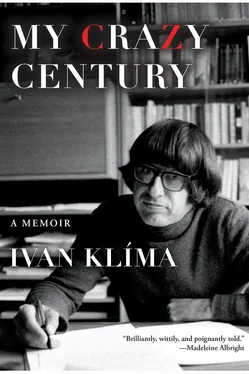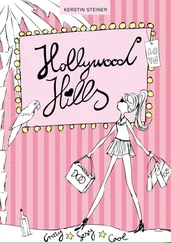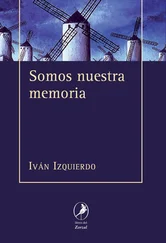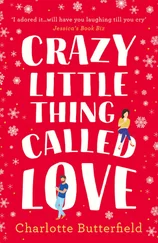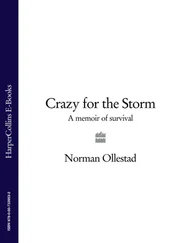Mother never received an answer to her letter, but about five weeks later we found a letter from Father in the mailbox with the stamp Uherské Hradiště . Father wrote that he was thinking about all of us and we shouldn’t worry about him. He was lacking for nothing and hoped we too were healthy and were somehow getting by.
The letter was written on gray paper, which immediately brought to mind the notes we were allowed to write from Terezín now and then.
Paradoxically, it was during this time that my probationary period expired, and I was to be either accepted or rejected as a member of the Communist Party.
At the meeting, my admission to the party was the last item on the agenda. In the lecture hall, shrouded in tobacco smoke, the chairman acquainted the party members present with my case. I was an excellent student. For reasons of health, I hadn’t gone on the summer work brigade. I had a good relationship to the collective. As far as my class origin was concerned, I had a white-collar background, but my uncles were national heroes and loyal members of the party who had fallen in battle against the Nazis. Now, of course, my father had been arrested, apparently for political reasons, so it would be necessary to consider carefully my possible membership.
I was given the floor in order to discuss my father’s situation.
I said my father was the victim of some sort of mistake or a false accusation. He would definitely be proved innocent.
A comrade addressed me from the floor and asked about my relationship to socialism.
I replied that I believed in its future.
The comrade was not satisfied with my answer. My father had obviously not believed in socialism and hated it. Was I prepared to disown him if it turned out he had committed a crime against the state? I was not prepared for anything like this. It was unthinkable that my father would get mixed up in any criminal conspiracy, and I answered heatedly that my father would never perpetrate anything like that.
The comrade from the floor held his ground and demanded a straightforward and unambiguous answer: yes or no. To my great surprise, the chair intervened. He said I had indeed provided an answer, and there was no need to anticipate the judgment of the court. Since no one had any further questions, they took a vote on whether or not to admit me. I was certain there was no way I would be accepted, and it was with amazement that I observed my classmates, the young assistants from various departments, staff members of the dean’s office, even the cleaning women raising their hands.
So I was accepted, and the chair invited me up to the table and congratulated me. My mood, however, was not at all celebratory. Instead I was oppressed by anxiety. It was as if I had been accepted into some kind of merciless holy order that could demand of you anything, even the renunciation of your own father.
*
Father hoped that we would somehow manage to scrape out our livelihood without him, which of course meant that I was supposed to manage it somehow. We had no savings (even if we had any, they would have been worthless after the currency reform at the beginning of the summer). Mother continued to believe the diagnosis according to which she wasn’t even supposed to be alive. Just as the mistaken doctor had advised, she tried to avoid any effort. She suggested that she could at least do some knitting at home, but there was no yarn to be had. She could also translate from French, but no one showed any interest.
On the bulletin board at the department I noticed an opening for a student assistant. Obviously no one had thought it worthwhile to apply. They paid only two hundred crowns a month for attending to library loans and cataloging book acquisitions.
I got the position and was at least able to pay for lunchtime meal tickets at the cafeteria, and for supper I always waited until the last minute before the kitchen closed, since the kindhearted cooks would give away part of the leftovers. So almost every evening I would bring home at least ten slices of lightly salted bread and a usually large military mess tin full of dumplings and some kind of sauce or at least thick soup from the very bottom of the pot.
My brother, who with surprising obstinacy had wiped from his memory everything related to our stay in Terezín, sometimes complained that the food from the mess tin reminded him of something unpleasant. Mother usually just nibbled on a piece of bread and said she had eaten some potatoes earlier. I had no idea what Father was eating. In my foolishness, I told myself that today’s prisons could in no way resemble wartime concentration camps.
But we couldn’t live like that for long. I knew I would either have to give up my studies or find some other, more lucrative source of income. But what did I know how to do? I had excelled in mathematics in high school, but I was already starting to forget it; and German, which I had picked up during the war, was also fading from my mind. I could paint a little, but I’d abandoned this hobby as well. All that was left was my writing.
Without a letter of recommendation, I set out after the holidays on a pilgrimage to the ever smaller number of newspapers and magazines and asked if they wanted me to do any reviewing. To my surprise, they offered me several books as a test. (Only later did I learn that lying around editorial offices are a great number of books, which almost every reviewer with any sense avoids.)
The selection of titles allowed for publication was meager. So I wrote about the stories of Karel Václav Rais, Mark Twain, and Maxim Gorky. Most of the books I was given to review were by officially approved Soviet authors. All of these authors wrote about the recently concluded war, a period that still fascinated me, and I was prepared to believe that the stories in these works would provide evidence of the new man, his bravery, and his Soviet patriotism. The texts had obviously been translated and brought out quickly. They were full of Russianisms and long-extinct participles. I certainly took in this cramped style, but at the same time there was the danger that it was affecting and perverting my own language.
I had no idea what was happening in the Soviet Union, the land that these authors so blatantly acclaimed and whose books I was recommending. But someone who has no idea should make an effort to acquire knowledge. If he does not succeed, he should at least keep quiet.
At the office of the Youth Club daily newspaper, for which I sometimes wrote reviews, I was offered the chance to attend a conference on Alois Jirásek’s novel Dog’s Heads . The conference was being held, appropriately enough, in Domažlice, where the novel takes place. Because the conference started in the morning, I was supposed to be there a day earlier, but I wasn’t to worry because the Youth Club would reimburse the cost of my lodging.
During a university lecture on Marxism, I was sitting (once again) next to Tatyana, and I told her that I would be gone for two days next week. I was going to a conference in Domažlice, and I wondered if she’d like to come with me.
She was surprised and nodded.
In case she hadn’t considered it, I pointed out that we would have to stay overnight.
Yes, that’s what she had assumed, since we would be there for two days.
The night before my first trip in the company of a girl, I slept poorly.
Did the fact that she had agreed to go with me mean that she had also agreed to spend the night with me in a single room or even amorously in a single bed? And what would I do if they didn’t put us in a single room? Knock on the door of her room and try to spend the night with her? Wouldn’t she see that as pure insolence? And what would I do if she let me in? I wasn’t sure that I was really in love with her. And if I wasn’t sure, then it wasn’t proper to act as if I wanted to spend my whole life with her.
Читать дальше
